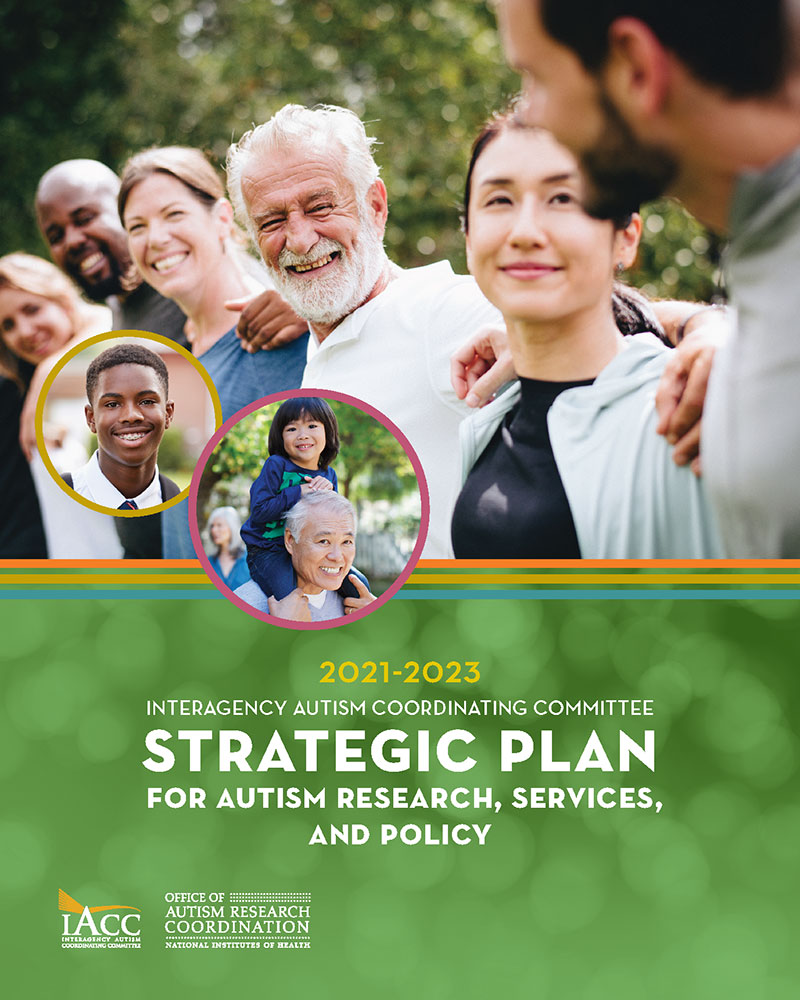IACC Strategic Plan
For Autism Research, Services, and Policy
2021-2023
Throughout this 2021-2023 IACC Strategic Plan for Autism Research, Services, and Policy, the IACC has highlighted recent advances in research that contribute to our under-standing of autism and its co-occurring conditions, diagno-sis and interventions, factors that influence outcomes, and services and supports that are needed by people on the autism spectrum across the lifespan. The plan also identifies remaining gaps and potential opportunities in research, services, and policy for autism-related issues.
Strategic investments in the autism portfolio have produced promising scientific advances over recent years. For example, research findings have highlighted effective approaches for screening and diagnosis, the identification of multiple biological, environmental, and social factors that contribute to autism and outcomes, improvements on existing interventions, and tools for autistic adults that enhance their health and well-being. Continued investments in these and other areas will have a significant impact on the lives on autistic individuals and their families.
In this edition of the IACC Strategic Plan, the committee has further emphasized the need to focus on autism across the lifespan, including improved screening and diagnostic tools for adolescents and adults, tailored interventions to address physical and mental health challenges, increased access to communication tools and devices, and expanded services and supports to improve community integration and maximize positive outcomes across the spectrum and the lifespan. The Plan also stresses the importance of reducing disparities and increasing equity so that all autistic individuals are able to have their needs met, regardless of their race/ethnicity, gender identity and sexual orientation, geographical location, socioeconomic status, or level of support needs.
Multidisciplinary approaches will be needed to address many of the existing gaps in autism research. The Com-mittee is encouraged by the growth in the field resulting from the entry of additional investigators and new funders to the research landscape, thus enabling novel, varied, and innovative approaches as well as additional sources of investment. The Committee also recognizes the importance of sustained partnerships between government and non-government organizations that work on behalf of people with autism and disabilities, and the need to actively engage with autistic individuals and their families to identify priorities for investment in research, services, and supports.
As with previous editions of the Strategic Plan, it is the IACC’s hope that this updated Plan will be used by federal agencies and private organizations to guide their research and services activities. With continued interagency coor-dination, the federal Departments and agencies involved in autism-relevant activities will assess existing programs and plan new activities that seek to close existing gaps. The 24 Recommendations in this Strategic Plan describe priorities for autism research, services and supports, and policy that reflect the most important opportunities and needs in the autism community. Included in these Recom-mendations are emphases on:
- Improving efficiency of and access to screening and diagnostic services
- Advancing knowledge of the biology of autism and co-occurring conditions across the lifespan
- Understanding the individual and combined contri-butions of genetic and environmental factors to the development of autism
- Developing a wide array of interventions and supports that will address needs across the spectrum and across the lifespan
- Implementing interventions and services in community settings and improving access
- Improving outcomes for adolescents and adults
- Supporting the infrastructure that enables innovative autism research and prevalence monitoring
- Understanding autism in girls, women, and LGBTQIA+ individuals
- Reducing racial and ethnic disparities and promoting equity across all communities.
The Committee also includes a Recommendation to substantially increase federal and private investment for autism research, services, and supports.
The IACC is committed to addressing the range of needs across the autism community, by discussing important topics and identifying gaps and opportunities, providing a forum for public input, and advising the Secretary of Health and Human Services on relevant issues. With this Strategic Plan and future Committee activities, the IACC reaffirms its commitment to improving the lives of people across the autism spectrum and across the lifespan so that they can achieve their full potential.




